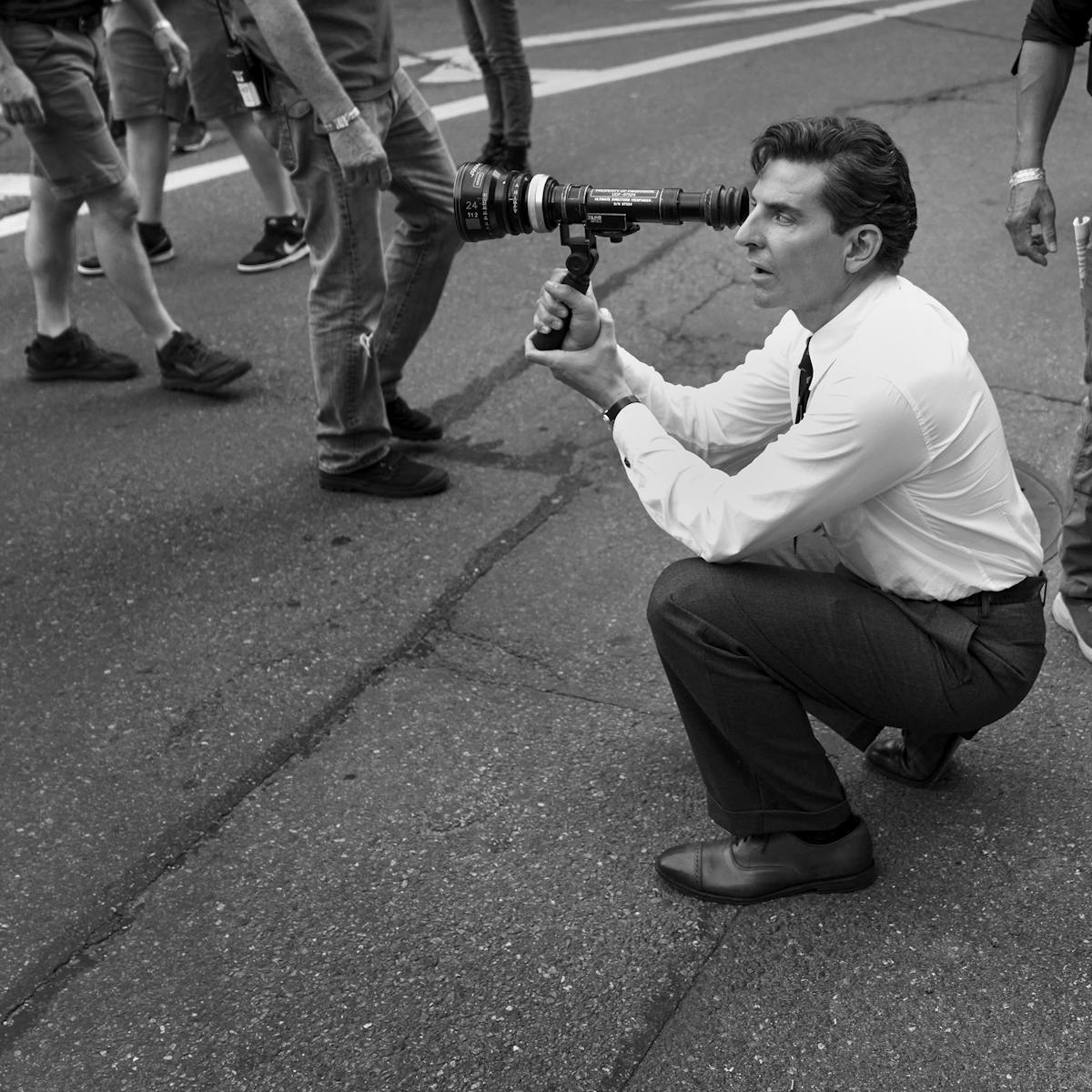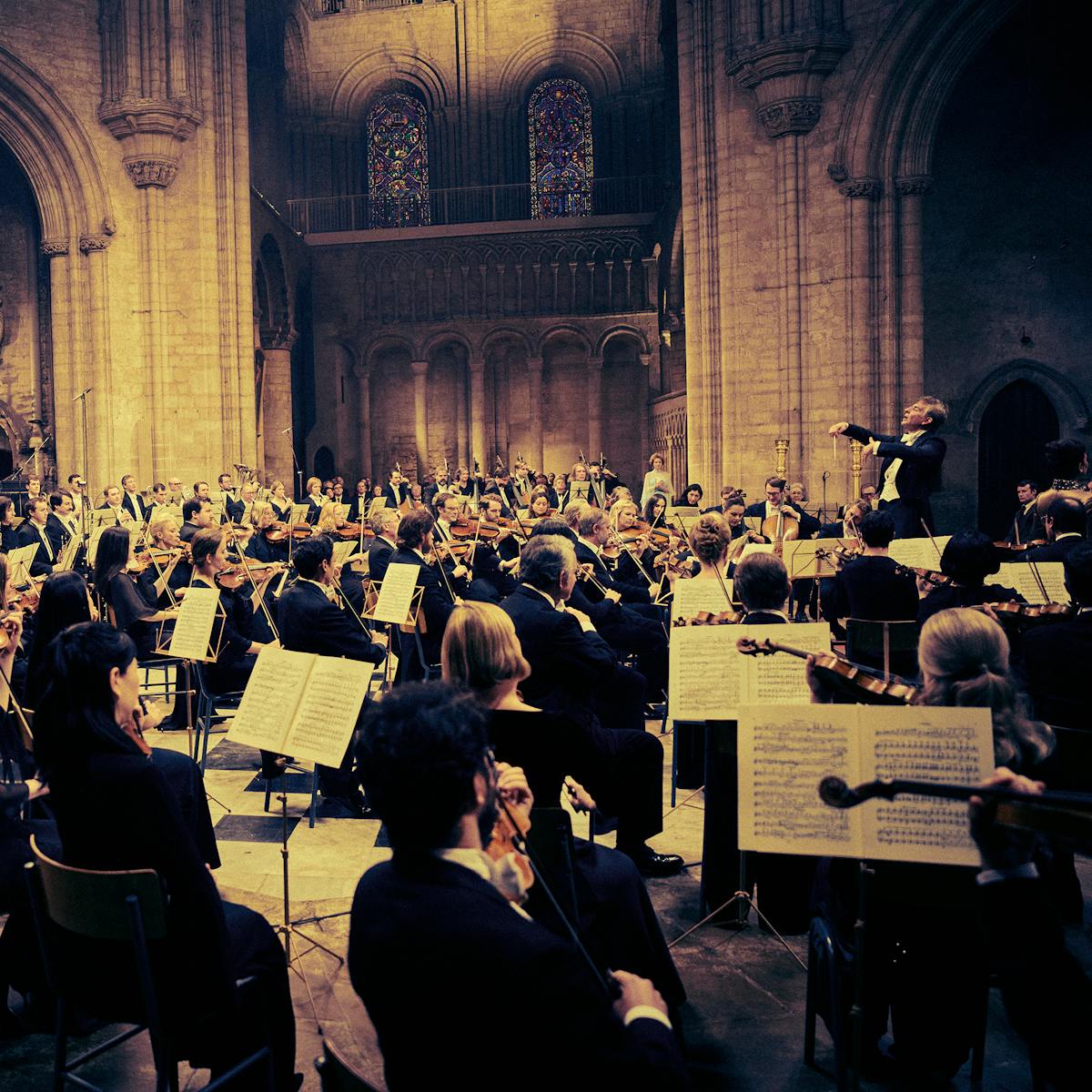Nina, Alexander, and Jamie Bernstein marvel at Bradley Cooper and Carey Mulligan’s portrayal of their legendary parents.
When director-writer-star Bradley Cooper set out to tell the story of composer and conductor Leonard Bernstein’s relationship with his wife, actor and activist Felicia Montealegre, one thing was immediately clear: Carey Mulligan must play Felicia. Who else but Mulligan could match the passion that Cooper brought to his own project? Together the pair gave life to a moving story of love and devotion that wowed audiences and earned the film seven Oscar nominations, including Best Picture and Best Actor and Actress for its stars.
After two years spent co-writing the now Oscar-nominated script with Josh Singer and embarking on research into Bernstein’s life, Cooper called on Mulligan, whom he’d met through the theater, to become his artistic partner. They spent four years preparing to portray the complicated relationship between Leonard and Felicia, practicing the acting method of dreamwork and narrating a performance of Bernstein’s Candide. Building a strong bond paid off, with Leonard and Felicia’s fiery chemistry captivating Maestro audiences around the world.
Here the stars and Leonard and Felicia’s children share the ways in which Cooper and Mulligan perfected the love story of Maestro.

Leonard Bernstein (Bradley Cooper)

Felicia Montealegre Cohn Bernstein (Carey Mulligan)
Creating Chemistry
“We did this dream workshop. I asked Carey to do it, to get to a place where we can show each other our souls in the most vulnerable possible way that we’re bonded for life. I know that sounds kind of heavy, but it’s actually what happens. [We] did it and saw sides of each other that we’re going to take to the grave; it bonded us, and I felt so free after that. I thought, Well, she knows me completely, and after that, I had no fear about us. I always knew her ability as an actor, but I didn’t know that we would have this connection.” —Bradley Cooper
“[This film] completely changed me as an actor. Bradley asked me to go all in, and it was the best experience I’ve ever had. I fell in love with acting more and fell in love with film more. It set an impossibly high bar, and I may never work again. It was all of that. It’s no hyperbole. It really was that to me. I couldn’t believe he asked me to do it, and I still can’t quite believe it, but it’s that. It was everything.” —Carey Mulligan

Leonard Bernstein (Bradley Cooper) and Felicia Montealegre Cohn Bernstein (Carey Mulligan)
An Unconventional Marriage
“I wanted to dedicate the real estate of the film to them. How could I serve the truth of his life within this marriage while not shifting the focus away from them? I wanted to make a movie about these two because that’s frankly what I found encapsulated everything. What is it to be these people at these certain time periods? What’s it like to be in this heterosexual nuclear family structure yet have these truths about each other?” —Bradley Cooper
“There were lots of swells of pride that were mixed in between what I felt. But I think that when it comes to the betrayal or the sense that she lost him, it’s not anything to do with sex. She was clear from the beginning. She knew exactly who he was. I say it in the film, and she said it in a letter to him, ‘I know exactly who you are, but I love you, and I want to make a life with you.’ I think she was always accepting that there were things that they didn’t need to talk about that would make him feel like a whole person.” —Carey Mulligan

Leonard Bernstein (Bradley Cooper) and Felicia Montealegre Cohn Bernstein (Carey Mulligan)
Making it Real
“We are thinking about the real people that we are playing, which I think we both felt deeply connected to. Bradley became very, very close to the children, and by that point, I was using [Felicia’s] lighter every day. It was engraved with her name. You’re not sitting there thinking this in an intellectual way, but you are aware that this conversation happened. This happened. The doctors had that conversation. This has happened to so many people, and there’s just something about that that’s just unavoidably moving, so you don’t have to act, really, because it’s just the truth of life.” —Carey Mulligan
“I mean, it sounds sort of hokey, but it didn’t ever feel that we were acting to me. It felt like there was some sort of calm, relaxation, openness, and then a channeling of allowing them to come in, and then us just to serve them. It felt like a very selfless exercise, ritualistic the whole time, and it’s only, I think, because of all the love. There’s just a lot of love in this movie.” —Bradley Cooper

Felicia Montealegre Cohn Bernstein (Carey Mulligan) and Leonard Bernstein (Bradley Cooper)
Disagreements at the Dakota
“[For the scene where Lenny and Felicia argue on Thanksgiving, which we shot as one uninterrupted sequence], I always wanted this voyeuristic quality where you almost feel like you’re watching something that you shouldn’t be watching, and at the same time, I didn’t want the audience to feel safe. I mean, when I would watch my parents fight as a kid, I never was in between the two of them looking at either one in a close-up. I was with my sister, 15 or 20 feet away. And that’s where that came out of originally, wanting that feeling.
It was one of the scenes that never changed. It’s just because of Carey Mulligan and her ability to run that scene that I could stay in that wide [shot] for the punchline. It wouldn’t work if I went to close-ups, then came back for the Snoopy reveal. The joke only works if you stay in the wide, but that wasn’t the main reason. Really, the whole movie is sort of leading to that scene. The movie’s not going to work [without it].
It’s complicated. I think that scene is about her still on that journey. To me, what’s heartbreaking is you’re watching her go through all of this, and her whole argument to him is that he’s not fulfilling his potential. She doesn’t say anything about what the fuck he’s doing, right? That’s her argument, and it’s not until then that she has that reckoning with herself and the audience.” —Bradley Cooper
“It was so like a play. It was three takes, and that’s the third take, and that was it, then we downed tools and went home. To a couple that have been in a relationship for that long, they tell a story when they tell anecdotes, they tell a story in a certain way, but they also fight in a certain way. This is something Bradley would do a lot, where he would direct me by playing Lenny in a certain way. So it would be less, ‘Here’s a note’ — he definitely did give me notes — but he would do something that would elicit a certain response in me.
So in that third take, he came in, he was a little bit more hungover than he’d been in the previous takes. He wouldn’t take his sunglasses off. He bumped into the furniture. All of these things were little annoying nuggets that pushed and pushed and pushed. And for some reason, that third take just took off.” —Carey Mulligan

Behind the scenes with Carey Mulligan and Bradley Cooper
Bringing History to Life
“Carey and I feel like it was divine intervention from Lenny and Felicia. I’ve never had an experience on a film like that. I felt like I’ve really gone deep and become someone else, but I’ve never really done it with someone who has become completely somebody else. It was just effortless.” —Bradley Cooper
“There was no impersonation I think. It was just more like, ‘Right, well this is someone who is.’ I definitely recognized things about her that felt quite other than me, like the way she spoke, and her frankness. I think to really do it takes a lot of work — and also not being nervous of making a fool of myself. There was lots of stuff about it that felt like a real risk, like improvising in character, which meant being so comfortable in the dialect that we didn’t even need to think about it.” —Carey Mulligan
“I’m just overwhelmed by what an incredible performance she drew out of herself. She’s the real deal. The thing about our mother is that she was so subtle. She was very hard to describe or encapsulate. She was quite her own creation and an interesting and unusual combination of elements that would be very hard to capture and, by golly, I don’t know how Carey did it, but she did it. She captured some essence of our mother that made us gasp when we watched her in action.” —Jamie Bernstein
“[Bradley] gets so many things right. Obviously, he’s done an extraordinary job of looking like my dad and conducting like my dad, but [there’s] just the general energy that he brings to the role. He didn’t know the guy at all, but his charisma, the way he would take over a room, the way he said the wrong thing sometimes, Bradley got so many of the details, it’s incredible.” —Alexander Bernstein
“The chemistry between our parents was so fluid and easy. Even when there was tension, the connection between them was so very strong, and they were able to get that. It comes through.” —Nina Bernstein




